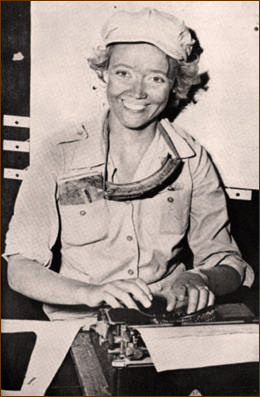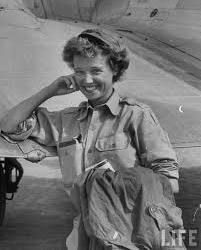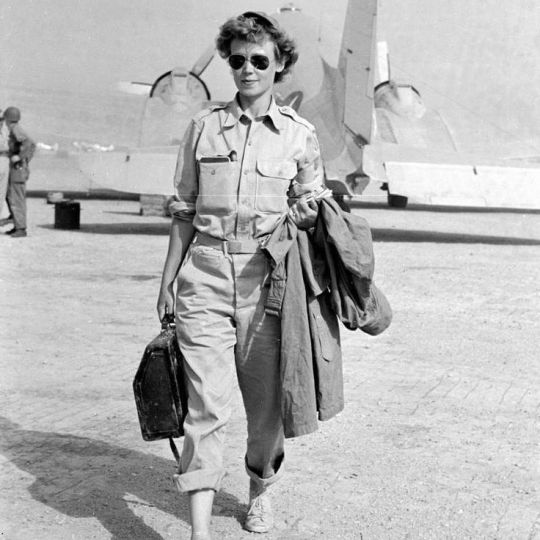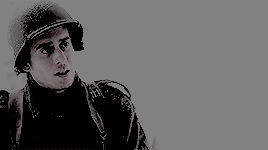#her name is Marguerite Higgins
Text
@brambleberrycottage I read Vespertine! Saved most of it for the second long drive of my Christmas break, and enjoyed having it. :)
I liked it. The worldbuilding premises of "ghost problems" and "conscripted spirit warfare" felt very Jonathan Stroud, but I think I like Rogerson's style better. I...wasn't sure how I felt about the use of some Catholic aesthetics and vocabulary, but it WAS really cool to see a medieval-fantasy-world's religion actually make use of medieval cathedrals and stained glass and illuminated manuscripts and so on. A depiction of Fantasy Not-France that includes gothic cathedral spires?? It made the whole thing feel more grounded, unexpectedly. (Also, I appreciate that the Catholic-coded Fantasy Religious Orders aren't evil. On the whole.)
I like Artemesia, too, and her relationships with the people around her. She's got quite a bit in common with El Higgins in the "stubborn unhappy goodness" department! I would definitely read more about her. (...Although, after reading Artemesia and Muderbot and El relatively recently, I'm feeling an unexpected craving for a first-person narrator who enjoys being around people. Where are all the extroverts at :P)
More spoilery comments under the cut:
Poor revenant. :( I assumed it was going to end up as a Friend but I wasn't expecting the backstory.
Also, poor revenant for being handed a girl who is this bad at noticing her own needs. Very stressful.
Again, I really liked that the religious orders were caring and benevolent, and even the messed-up members of the structure like Leander and the Divine felt more like... people who had slipped through the cracks. Even with all the Dark Secret Backstory, it didn't feel like the tired old "organized religion as a corrupt institution" take.
Speaking of Leander! I DID guess pretty early, I think, that he wasn't evil, mostly because we keep getting glimpses of him looking less evil when he thinks no one's looking. Poor boy is just Very Stressed. I did not at all guess the Divine's deal, though.
I was excited when Marguerite showed up, because I could tell she was going to get Unexpected Depth, but the eventual conversation between her and Artemesia surpassed my expectations. I love all complicated sibling-adjacent relationships, and I think theirs qualifies by the end.
I also love the guards! And that the people in general so consistently look at Artemesia and see she's a hero—a refreshing approach to this sort of "rogue hero on the run" thing. But I especially love the Captain (even if I don't remember how to spell his name).
Also Priestbane! So glad she got her horse back.
This isn't exactly spoilery but: I really like the worldbuilding choices that feel like medieval Europe, as said above. It feels honest in a way a lot of medieval-ish aesthetic fantasies don't, though I couldn't quite pin down how.
Additionally, the aesthetic choices do a good job at making Artemesia Very Cool. Which I approve of. And I like the way Rogerson writes imagery, in general. It's just...pleasing to me.
My favorite scene might be down in the tunnels when she realizes the revenant is also a kicked goat. It feels like one of the biggest turning points, even though they'd been building friendship for a while, and brings together all the parallels between them in a way I really like.
I would love to see Artemesia run into her little brother in a sequel.
I am also staring at the spirit classification chart, very suspiciously, and I am thinking WHERE DO SUICIDES GO IN THIS.
Seriously, I kind of assumed the penitent was a suicide. But no, that cause of death isn't listed here at all... I am Eyeing This Omission With Interest.
Anyway, thank you again for this! :)
7 notes
·
View notes
Text



Ever have a crush on a woman and realize she‘s dead
#her name is Marguerite Higgins#I read a book about her and she’s super cool#she was a reporter and won a Pulitzer for her writing during combat#history#i would love to hear about her from the professor#but he’s dead#nonsensical talks
2 notes
·
View notes
Text
what kind of man?
Joe Toye x Reader
Summary: Assigned as a war correspondent to the European Theater, a string of fluff piece assignments makes apparent you’re a novelty to sell newspapers. You yearn for an interview with someone who will tell you the truth--something real--and you find honesty in a man with a missing leg and a battered copy of War and Peace.

You knew, when Ed McCormick—the human interest editor—slid an Atlantic ocean liner ticket across your (frankly, overflowing) desk along with the declaration of ‘congrats, kiddo, you’re a war reporter,’ there had to be a hitch. The New York Times doesn’t send female war correspondents across the Atlantic Ocean and catapulting into a war zone on a whim—because they think you’ve got gumption, or a certain spark, or felt like taking a chance. You aren’t exactly Martha Gellhorn or Marguerite Higgins—but then again, the Times doesn’t have a Gellhorn or a Higgins.
And now, you’re in an Army hospital in Paris, confronting once again what exactly that hitch is: you’re the novelty ‘girl writer.’ It’s all the rage.
“How long will he make us wait?” you ask, glaring down at your watch face as if you could bully the minute hand to stop moving. To stop showing this Dr. Carl fucking Wainwright, the latest in a long like of interviews for fluff pieces, has kept you and Fred, your photography, waiting for almost forty-five minutes.
“As long as they feel like,” he says, as he lights a cigarette. He uses it as a lecturer’s wand to indicate the ward, populated by wounded and recovering GIs, the smoke leaving a trail. “We’re pretty low on the priority list, kid.”
You lift your eyes to the ceiling, knowing Fred knew as well as you did that wasn’t the whole truth. In the month and a half you’ve been in Paris, the interview appointments you’ve had with doctors, colonels, pilots, naval captains have been consistently well away from the frontlines, the start time delayed or postponed, often cut short when they do begin, all the answers you gather as sweet and vapid as candy floss. No one wants to show the war as it always is, worrying what will happen if their honesty appears on the front page or that the pretty little war correspondent isn’t the one to write about it. “They know I’m not chump change.”
“Nah,” Fred replies. You cock an eyebrow at him as he sucks on his cigarette, wondering if he’s about to compliment you. You had been sure Fred didn’t know how to string one nice—or attempted nice—word after another. He puffs smoke out in a great cloud. “It’s because you’re a girl. They know you’re here to add bit of emotion and feminine touch to this disgusting fucking war.” His words hold no bite, only a crackling frankness, and they land all the harder across your cheek. “You slap your name onto some fluff pieces about the great noble sacrifice of our heroic, home-grown, American boys, and fuck, that’ll sell more papers than my pictures will.”
You bite your lower lip to keep from spitting out something you might regret; it’s not like you didn’t know it, in some dark recess of your conscious.
The girl writer, you think, snorting and crossing your arms over your chest. You squint out of the hospital ward’s window, the early autumn afternoon overcast, the gray clouds swallowing the gray steel of the Eiffel Tower. You didn’t need Fred to tell you what you already knew. Yet, sent something sharp and metallic cut into your chest, settling just below your throat. But, you try to bolster yourself, You still got an opportunity. Martha, Marguerite: they started somewhere, too. All it took was an opportunity seized tight in a clenched, white-knuckled fist.
“I just wish I could get a real chance to write something more than fluff,” you say more to the Eiffel Tower than Fred. “I bet I could sell more than an extra paper here or there. I need something I could really sink my teeth into—something real. What the war is like really.”
Smoke curls out of Fred’s mouth. He’s squinting at you, but he’s always squinting at something. It’s why he avoided the draft—his eyesight making him near blind, his refusal to wear glasses making him near stupid—but you’ve come to rely on its consistency. Good old squinting, surly Fred, who saw the world clearer through narrowed eyes than an optometrist could ever help with. He says, “You want some coffee to wash down what you’re sinking your teeth in to?”
“Coffee?” you repeat.
“Sure.” He shrugs toward the closed door of Dr. Wainwright’s office. “Doc’s kept us waiting long enough, I figure we can drink some of his coffee.”
“Ah,” you say. “Well, no, but thank you.”
Fred shrugs. “If he decides to stick his nose out, have someone kind find me.” He doesn’t stick around for an answer, one hand on his camera, hung around his neck, as he trots from the ward. He sends you a wink before he vanishes into the hall.
Sighing, wishing you didn’t have the brand of ‘the girl writer’ seared onto your forehead—what would it be like if you could waltz off to coffee without worrying how’d it look like, what your boss might think, what it might do to your reputation? Pretty damn relaxing, you think, drifting between two cots, the men in either asleep, and lean a hip against the window. Would Martha or Marguerite let themselves be walked over by this Doctor Wainwright? Or yesterday’s Lieutenant Aryes? Or last week’s Captain Sobel?
he Parisian cityscape offers no answers.
“Hey, lady,” a raspy voice calls. Another: “Lady?” Pause, and finally, short and swift and sharp: “Window girl!”
Breath catches in your throat. Jerking away from the window, you find a soldier two cots away fixing you with a frown. His dark eyes are somehow more disapproving than the downward quirk of his mouth. A book is opened on his stomach. “You’re blocking my reading light,” he says after a beat, you blinking at him.
“Oh, uh,” you reply, intelligently, taking a mincing step away from window only to bump into a cot’s table laden with water and medicines. It takes a quick hand to steady the rattling glasses, and your breath catches as the cot’s occupant grumbles in his sleep—threatening to wake—only to turn onto his side and snore once. Loudly. You exhale. Thank fuck. What kind of person wakes an injured soldier?
“That was elegant,” the dark-eyed man observes dryly.
Moving away from the window and side table, you can’t help your eyes narrowing. “My deepest thanks for that compliment, solider; I’m sure it was entirely sincere.” You feel a whoosh and a plunge in your chest the moment the words are from your mouth because what the fuck? What kind of person says that to an injured soldier? You want to grab the words from the air and stuff them back into your mouth.
But the raspy solider, he, well, he grins?
The disapproval in his eyes has flicked off, a light of interest kindling, and those eyes are sweeping over you, considering. Goosebumps raze your skin, your cheeks flushing, with the prickling heat of his eyes on you and—“You some kind of reporter?”
Crossing your arms, you reply, “I’m not ‘some kind of reporter;’ I am a reporter. A war correspondent. For the New York Times.”
“Oh yeah?” He cocks an eyebrow as if asking if he should be impressed. The heat still burns in his eyes. He’s enjoying this, you realize. “What was all that about sinking your teeth into something real then? Doesn’t seem like you’re a war correspondent for the Times.”
“I am a real—” you being to protest hotly, but under your glare, his lips twitch precariously close to a smile and you bite off your words. “You’re making fun of me, aren’t you?” Your tone is flat.
His smile grows. “Nah, not you in particular, more anything that makes being in a fucking hospital a little less boring.” You expect him to stutter to an awkward halt, to apologize for swearing in front of you—a lady—but he doesn’t. You can’t help mirroring his smile. “I mean, look, I’m reading for Christ’s sake! I never read.” He waves to the book still on his stomach, and you move a few steps closer to read the title and the English major, shut away in your heart since you graduated from Brown three years ago, sings.
“War and Peace?” you say. “That’s appropriate.”
He wrinkles his nose faintly. “I guess, but I’d rather fucking eat it then read another word. It’s horrible! Boring and unrealistic, I mean, seriously, are you telling me that this Andre fella isn’t going to kiss the living-fucking-daylights out of that Natasha broad before he goes off to war? Fucking war? Or that Pierre ain’t going to kiss her? Jesus.”
You consider pointing out, though apparently horrible, he is awfully invested in the romantic entanglements of the main characters. Instead, you settle on, “What would you change to make it more realistic?”
He shrugs, shifting in his bed. You’re not sure if it’s because you’ve drifted to stand over him, or if no one has asked his opinions on literature before, but you pull up a nearby chair to at least alieve one issue. He stares at you for another moment, jaw working, trying to decide something, before settling on: “Well, I can’t really say what’s unrealistic or not about the fucking Napoleonic war, but if you’re wanting a book about war and peace now, I’d tell you to write more—like, a fuck ton more—about soldiers being scared out of their goddamn minds. I am, uh, was a paratrooper until…” he nods toward his legs—well, no, not legs. You realize, blinking and hiding your surprise poorly, where one leg shoulder be, the sheets are deflated. Amputated, he’s destined to relay on one leg and a crutch for the rest of his life, all in service of his country.
Your stomach clenches painfully. You release a silent, steady breath, focusing doggedly as he gathers his thoughts and continues: “I had jumped out of a plane five times just for the right to call myself a paratrooper, right? But, on D-Day, when that plane was flying through a fucking Fourth of July fireworks show as the Germans were firing over us? I might as well have never jumped once. I stood there, waiting and waiting, for the red light and then the green light to turn on thinking, any second, a German anti-aircraft shell would send us up in a great fireball.” He pauses. To the battered novel, he says softly, “I’ve never been so scared.”
Balling your fingers into fists, hidden in the cloth folds of your lap, you restrain yourself from leaning forward to take his hand. He doesn’t need your sympathy, and you don’t have empathy—you could never understand the hell he’s seen. So instead, you ask: “What about the peace?”
He doesn’t reply immediately, his dark eyes dragging reluctantly away from you, as if fighting a magnetized pull, and to his book. Movements slow, as if forgetting the fingers beating a lazy rhythm onto the book’s cover belonged to him, his eyes grow distant. You watch him fall into his memory—allow in memories of terror, his comrades, the firefights, death—and you’ve seen eyes untethered from reality (hell, you’ve seen amputated legs before) but seeing this man, this soldier who talked about literary characters kissing and seasoned his speech with ‘fuck’ like a cooking spice, it meant more. Landed heavier in chest, packed a punch that left you winded around a clenching throat.
I don’t even know his name, you think.
“I think that’s my big problem with it,” he begins slowly, nodding again to the book. “‘War and Peace.” He snorts. Then repeats, low to taste the words in his mouth: “War and peace. Implying that the two can coexist. There isn’t peace, there hasn’t been since ’41 when we got dragged into this fucking war. War murders peace; when you aren’t getting shot out, you’re thinking you might get shot at, or dreaming about being shot at, or your buddy’s shot. You’re constantly wound tight, waiting in the time in between, because there’s no peace. It’s just a lapse in hell so Death can trick you again, and worse this time around.” He says ‘death’ with a capitalization, as if it’s a proper noun, a close friend, someone he’s dined with multiple evenings in a row. A grin spreads on his mouth. “Guess I gave you what you wanted, huh? How’d you trick me into doing that?”
“What?” you ask, blinking. You forgot the origin of the conversation
“You said you wanted to write about the real war.”
“Oh, I do, but…” your voice fades in thought.
“But?”
“But, I won’t use what you told me.”
His dark brows furrow, mouth turning into a downward slash. “What? Why? Do you want something more glorious or heroic, because, lady, I thought you said real—”
“I won’t use it because,” you say over him, holding a finger up to silence him. He presses his lips into an annoyed line, but he swallows his words. “Because of two reasons. One: I haven’t asked permission. May I quote you in a story?”
Jutting his chin out mulishly, he shrugs and you see in him the little, obstinate boy he used to be. You briefly wonder what hell he gave his mother (you briefly wonder why you suddenly feel a fervent hope to know about his childhood, his mother, his family, his life). “Sure, yeah, why not,” he says. “What’s the second reason, then?”
“I don’t know your name.”
“Oh.” In his raspy voice, the word is almost a musical note. “Joe Toye. I’m with the Airborne, the 101st.”
You tilt you head, unable to keep from smiling at the simplicity of it—Joe Toye—and how his name came in the same breath with his division; a division that warmed his breath, squared his shoulders, and puffed his chest. He’s proud to be a—it takes a moment for your mind to come up with it—a Screamin’ Eagle, or maybe prouder to be associated with the men who also wore the Eagle. Still smiling, you offer your name, adding, “I’m with the New York Times.”
He doesn’t give the usual lines you’ve heard from men—‘pretty name for a pretty girl,’ ‘nice name, but can I call you mine?’—instead saying, “Good to meet you, uh, formally. And thanks for listening.”
A crooked grin twists your lips up. “Listening is literally my job.”
“Take the compliment, would you, woman?” he asks, laugh barking and brief, the noise scattering goosebumps onto your arms as it zips over your skin, only to burrow and live in your memories. When he quiets, when the blush on your face threatens to permanently stain, he props himself up further, dog-earring War and Peace and putting it aside. To his fingers, stitching and unstitching themselves on his lap, he says, “Nah, I mean it. It’s been awhile since anyone has taken the time to listen to me just, you know, say shit.”
“Well, you’ve got a lot of interesting shit to say,” you say, mildly and trying your best not to let your voice quiver. You want to inject the swirling tide of emotions boiling in your chest into your words, to make him understand just how much you feel your words—instinctively feel his worth, his importance—but what kind of person does that? What kind of person acts all emotional at a guy she literally just met? A silly girl, your brain supplies, unhelpfully.
But you know you failed because Joe’s looking at you all strange—all quirked eyebrows, mouth parting into a surprised ‘o,’ and his eyes seeming to flicker—and you snap your mouth shut. The blush, you’re sure, will redden you as a badge to what a colossal, idiotic, overly-emotional girl you are and forever will be.
What would Marguerite or Martha do? you ask yourself.
“Miss?” a voice says then, interrupting your internal spiral. “Miss—uh, Miss…?”
“Y/n,” Joe says, a question pitching your name up. “I think he’s talking to you?”
You turn and, from the name patched onto his lab coat, find yourself blinking at the elusive Wainwright. He’s a thin man, wiry and wrinkled and tired, and he blinks expectantly at you from behind round glasses. “I’m sorry to keep you waiting, Miss, but I’m ready to interview now.”
“Oh, um,” you say, standing, and running nervous fingers over your hair and hoping the fluffing you put it through before you left the hotel—over two hours ago now—hasn’t completely deflated. “Wonderful, great, I’ll just…” But your words catch in your throat because you do something you shouldn’t have: you glance down at Joe and he’s—
He’s grinning at you just as he did when you sassed him, an eye-tooth dominated smirk, creasing his eyes as if every inch of his face wants to be involved. You empty your lungs in a long breath. Joe Toye. Joe Toye curses even though you’re a female, he looks at you with bright interest and tells you what’s real. He doesn’t shy from the fear and exhaustion that every other person you’ve spoken with tries to keep out of the newspapers—or protected and secreted away from the pretty little war correspondent.
“Actually,” you begin, knowing when Fred eventually returns, he’ll redefine hell for you, “I just needed to speak with you to see if interviewing this soldier here was okay.”
“Oh, uh,” Wainwright says. He adjusts his glasses, though they sat just fine on his nose, eyes darting between you and Joe. “If he’s agreed, then yes, of course.”
You nod, smiling your most charming. “Thank you, sir. Awfully kind of you.”
“Sure,” Wainwright replies, already drifting away to tend to other demands on his hospital ward.
Watching him go, you cling to the few seconds of an excuse before you have to look at Joe and judge his reaction.
Joe doesn’t wait for you to look at him. Voice quiet, he asks, “Why did you do that?”
“Because,” you say, tearing your eyes from Wainwright’s back and to Joe. Joe, who’s eyebrows are pinched and who’s eyes flickering again. “Because you have more interesting shit to say.”
A week later, an article appears in the Times, “A Screaming Eagle Talks: An Interview with an Elite American solider.” You receive a clipping of it along with a letter asking if you want his autograph. It’s the fifth letter you and Joe exchange. You send them to each other—at first across France, then across the Atlantic when he returns Stateside—but you stop counting at eighty-four letters (the war’s over and you get to hear, instead of read, all the interesting shit by then. Of course, Joe insists he’s only got something interesting to say if you’re writing it).
#band of brothers#band of brothers imagine#band of brothers imagines#band of brothers fic#hbo war#joe toye#joe toye imagine#one shot for yall#happy belated joe day#my writing
74 notes
·
View notes